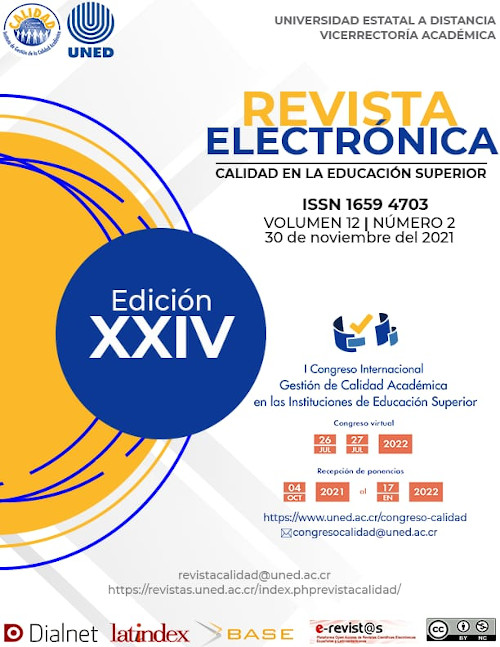Formation of values from instruction in mathematics: an experience using virtual forums
DOI:
https://doi.org/10.22458/caes.v12i2.3491Keywords:
Values of formation, Virtual forum, Real functionsAbstract
This paper analyzes an experience with 30 second-year computer science engineering students when they apply knowledge of real functions of a real variable to solving real problems using virtual forums. The objective of the work is to analyze from the level of interaction of the messages, the contribution to the formation of values from the instruction. The results generally reflect, average levels of interaction were achieved. In addition, the increase in participation in both quantity and quality presented the importance of the justification of their arguments and the reply to their colleagues, where the formation of values such as responsibility, honesty and creativity is reflected.
References
Aballay, L., Aciar, S., & Reategui, E. (2017). Método para la detección de emociones desde foros utilizando Text Mining. Campus Virtuales. 6(1), 89-98.
Abawajy, J. (2012). Analysis of asynchronous online Discussion Forums of Collaborative Learning. International Journal of Education and Learning, 1(2).
Benítez, M., Barajas, J., & Noyola, R. (2016). La utilidad del foro virtual para el aprendizaje colaborativo, desde la opinión de los estudiantes. Campus Virtuales. 5(2), 122-133.
Cheng, C. K., Paré, D. E., Collimore, L. M. y Joordens, S. (2011). Assessing the effectiveness of a voluntary online discussion forum on improving students course performance. Computers and Education, 56(1), 253-261. https://doi.org/10.1016/j.compedu.2010.07.024
Camarena, P. (2009). Mathematical models in the context of sciences. En M. Blomhoj y S. Carreira (Eds.), Mathematical applications and modelling in the teaching and learning of mathematics (pp. 117-131). Dinamarca: Roskilde University.
Daher, W. y Awawdeh, J. (2015). Pre-service teachers’ modelling processes through engagement with model eliciting activities with a technological tool. International Journal of Science and Mathematics Education, 13(1), 25-46. https://doi.org/10.1007/s10763-013-9464-2
Dyment, J. y O’Connell, T. (2011). Assessing the quality of reflection in student journals: a review of the research. Teaching in Higher Education, 16(1), 81-97. https://doi.org/10.1080/13562517.2010.507308
Hrastinski, S., Keller, C. y Carlsson, S. (2010). Design exemplars for synchronous e-learning: A design theory approach. Computers and Education, 55, 652-662. https://doi.org/10.1016/j.compedu.2010.02.025
Juárez, J. A., Chamoso, J. M. y González, M. T. (2020). Interacción en foros virtuales al integrar modelización matemática para formar ingenieros. Enseñanza de las Ciencias, 38(3), 161-178 https://doi.org/10.5565/rev/ensciencias.3041
Kaiser, G. y Schwarz, B. (2010). Authentic modelling problems in mathematic‒examples and experiences. Journal für Mathematik-Didaktik, 31, 51-76. https://doi.org/10.1007/s13138-010-0001-3
Leyva-Estrada, T. y Jiménez, R. (2016). Enfoque político ideológico en exámenes de matemática numérica. Simposio Internacional de Educación y Pedagogía. Universidad de las Tunas, Cuba. Celebrado el 12 y 13 de diciembre de 2016. ISBN 978-1-945570- 14-8. https://redipe.org/wp-content/uploads/2019/04/Libro-cuba-2016-1.pdf
Llinares, S. y Valls, J. (2009). The building of pre-service primary teachers’ knowledge of mathematics teaching: interaction and online video case studies. Instructional Science, 37, 247-271. https://doi.org/10.1007/s11251-007-9043-4
Murillo, R. y Marcos, G. (2009). Un modelo para potenciar y analizar las competencias geométricas y comunicativas en un entorno interactivo de aprendizaje. Enseñanza de las Ciencias, 27(2), 241-256.
Ornelas, D. (2007). El uso del foro de discusión virtual en la enseñanza. Revista Iberoamericana, 44 (4), 1-5.
Penalva, M. C., Rey, C., & Llinares, C. (2011). Identidad y aprendizaje de estudiantes de psicopedagogía. Análisis de un contexto b-learning en la didáctica de la matemática. Revista española de Pedagogía. 69(248), 101-118.
Plan de Estudios E. (2020). Modelo del Profesional. Universidad de las Ciencias Informáticas.
Veytia Bucheli, M. G. (2021). La estructura argumentativa en estudiantes de posgrado a partir de foros virtuales. Revista Conrado, 17(78), 234-239.
Ruiz-Corbella, M., Diestro-Fernández, A., & García-Blanco, M. (2016). Participación en foros virtuales en cursos masivos (UNED). Revista electrónica de investigación educativa, 18(3), 121-134.
Villarruel, M., Pérez, F. y Alarcón, G. (2015). Caracterización de la identidad docente a partir de la comunicación en foros virtuales de capacitación. México.
Los foros son espacios colaborativos orientados a generar discusiones académicas que contribuyen al desarrollo del pensamiento crítico estratégico a partir del diálogo, cuya finalidad es suscitar un debate virtual, aunque no necesariamente agotar un tema (Penalva, et al., 2011).
Downloads
Published
How to Cite
Issue
Section
License
Esta revista provee acceso libre inmediato a su contenido bajo el principio de que hacer disponible gratuitamente la investigación al publico, lo cual fomenta un mayor intercambio de conocimiento global.
